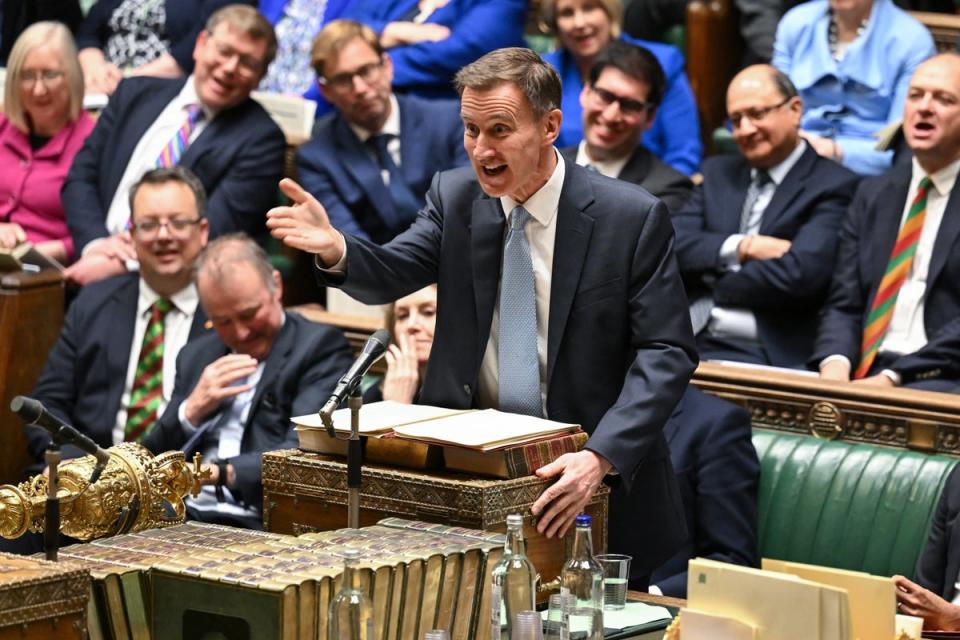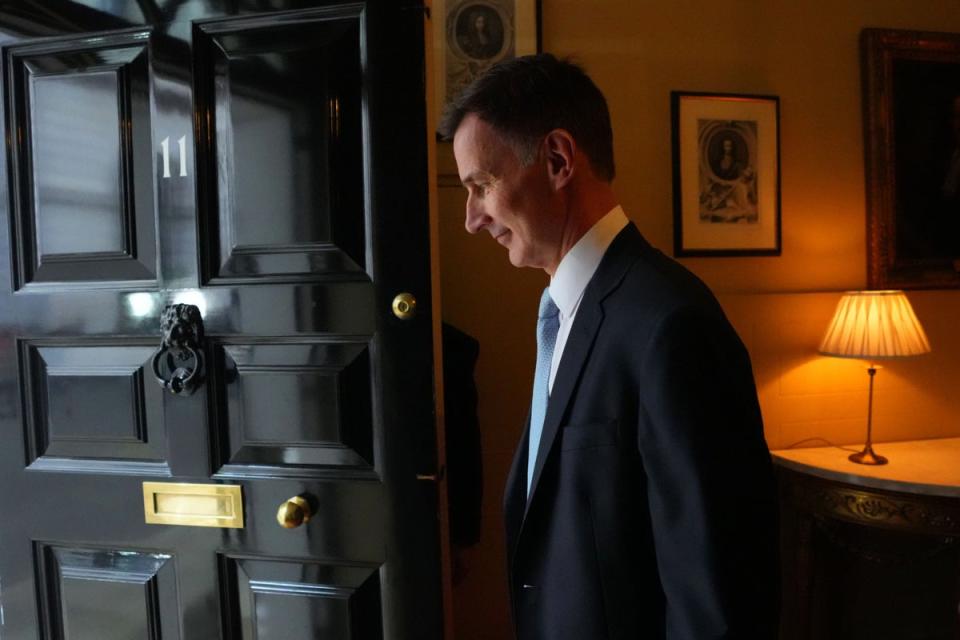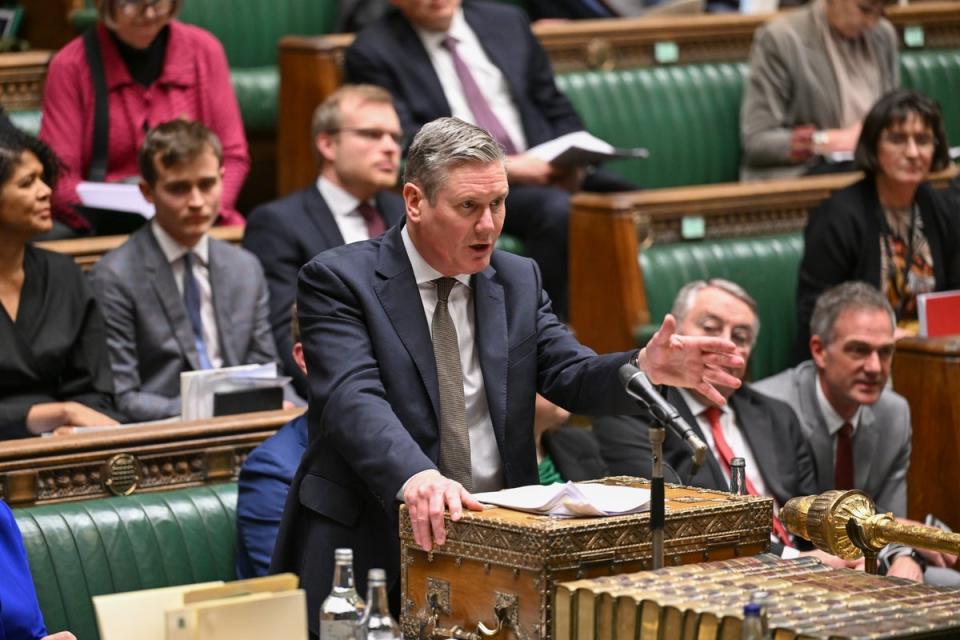Jeremy Hunt’s 2p Budget tax cut is not ‘silver bullet’ to rescue party, George Osborne warns
Jeremy Hunt announced a pre-election giveaway Budget in which he cut taxes for millions but almost immediately faced warnings from senior Tories that he had failed to deliver a “silver bullet” to save his party.
The chancellor slashed 2p from national insurance – and signalled his desire to abolish it altogether – in a bid to woo disgruntled voters. Combined with a similar cut at the end of last year, Mr Hunt said a person on an average salary of £35,000 would be £900 a year better off.
But in a withering assessment, the highly respected Institute for Fiscal Studies (IFS) said for every £1 handed back to voters by the chancellor, the decision to freeze tax thresholds would claim £1.30.
In a Budget shamelessly designed to appeal to voters ahead of the looming general election, Mr Hunt also announced an extra £6bn for the NHS and reforms of the “unfair” child benefit system, which will help 170,000 families.
Despite the headline-grabbing policies – including freezing fuel and alcohol duty – former chancellor George Osborne said it was not enough to turn his party around, adding: “It is not the silver bullet that’s going to rescue the Tory Party’s fortunes.”
Another former chancellor, Lord Lamont, said the measures would not transform “the political weather”, while arch-Sunak critic, Tory peer Lord Frost, said cutting NI without changing income tax was “fiddling while Rome burns”.

And in an extraordinary move, serving energy minister Andrew Bowie criticised the Budget less than an hour after it was announced, describing the extension of a windfall tax on oil and gas as "deeply disappointing”.
The developments came as:
Mr Hunt used a deeply political budget to steal Labour’s flagship plans to scrap tax breaks for non-doms
It emerged Rishi Sunak had recused himself from discussion of the non-dom policy, two years after The Independent revealed his wife held the controversial status
Mr Hunt announced a new levy on vapes, an increase in tax on tobacco and higher taxes on airfares and holiday lets
The overall tax burden was still forecast to rise to a near post-war high, following the national insurance announcement
A senior Tory MP, Harriett Baldwin, the chair of the Treasury Select Committee, said a general election on 2 May was a “possibility”
The Conservatives also faced the prospect of losing their leader in Scotland after he vowed to rebel and vote against the extended windfall tax
With nothing in the Budget to help first-time buyers, personal finance guru Martin Lewis said Mr Hunt had privately told him he wanted to ensure house prices were “definitely rising” before offering a “big home ownership package”.
In a Budget designed in part to steal Labour’s thunder, Mr Hunt swiped one of Labour’s flagship policies, by announcing a crackdown on “non-doms”, a move he said would raise nearly £3bn.
Before he unveiled his plans, Mr Hunt released a video in which he said that “great Budgets can change history”, but Sir Keir Starmer said the package was the “last desperate act of a party that has failed”.
The Labour leader dubbed Mr Sunak and Mr Hunt “the Chuckle Brothers of decline”, and accused the pair of “dreaming of Santa Monica or maybe just a quiet life in Surrey – not having to self-fund his election”.
His comments reference the prime minister’s multimillion-pound holiday home in the US and recent revelations that the chancellor has donated £100,000 of his own money to his local constituency party amid fears he risks losing his seat.

Unveiling his 2p national insurance cut, the chancellor told MPs that “the way we tax people’s income is particularly unfair”.
“If you get your income from having a job, you pay two types of tax – national insurance contributions and income tax. If you get it from other sources, you pay only one,” he said. “This double taxation of work is unfair [and]… penalises work instead of encouraging it.”
The chancellor is understood to ultimately back the abolition of NI entirely.
The national insurance cut from April will be worth an average of £450 for workers and £350 for the self-employed. Combined with the same cut announced last year, it will be worth an average of £900 for 27 million workers and £650 for two million self-employed.
Mr Hunt said the move would mean the average earner had the “lowest effective personal tax rate since 1975” and one that is lower than in America, France or Germany.
But a series of frozen thresholds will see many more people dragged into higher tax brackets, the so-called fiscal drag.
The Budget watchdog, the Office for Budget Responsibility (OBR), also warned that, even with the national insurance cuts, tax as a share of gross domestic product, a measure of the size of the economy, will rise to a “near to a post-war high”.

The child benefit reforms will see the earnings threshold at which it is taxed rise from £50,000 to £60,000 from April, with parents receiving at least some help until they earn £80,000.
Mr Hunt secured his giveaways by the skin of his teeth, the OBR also revealed, as it warned the chancellor was set to meet his fiscal rule of having national debt falling as a share of GDP in 2028-29 by a “historically modest margin” of just £8.9bn.
In what will be seen as an argument against an early election, Mr Hunt also said inflation is set to fall to below the target of 2 per cent “in a few months’ time”.
As he sought to raise money to fund his giveaways, he also cut the top rate of capital gains tax on property sales, from 28 per cent to 24 per cent, a move he said would raise more money by increasing activity in the market.
Mr Hunt also said GDP is set to grow faster than previously forecast by the Budget watchdog. The OBR forecasts growth of 0.8 per cent in 2024, up from the 0.7 per cent anticipated in November.
“Because we have turned the corner on inflation, we will soon turn the corner on growth,” the chancellor said.

He rejected moves that could have seen him cut future public spending but did announce expected improvements in productivity.
There will be a package of NHS reforms that will “slash the 13 million hours lost by doctors and nurses every year” as a result of out-of-date IT systems. He also promised an additional £2.5bn for the NHS to “meet pressures in the coming year”, with a total package of nearly £6bn.
Other changes to emergency services could include using drones as first responders to incidents, as part of a £230m plan to roll out new technology to speed up police response times.
Mr Hunt also confirmed a new British ISA which would allow an extra £5,000 of tax-free investment in UK assets.
For businesses, Mr Hunt increased the threshold at which small firms have to register for VAT from £85,000 to £90,000.
Tax rises included a widely anticipated levy on vaping, which will be introduced in October 2026, and an increase in tobacco duty. Mr Hunt also announced the abolition of tax breaks on holiday lets, which he said would raise £245m a year.


